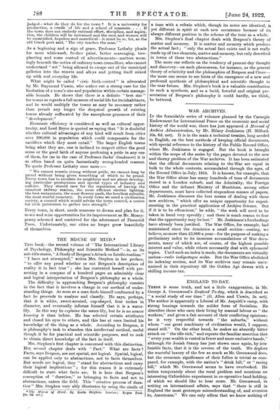THE MISUSE OF MIND.* Tins book—the second volume of "
The International Library of Psychology, Philosophy and Scientific Method "—is, as its sub-title states, "A Study of Bergson's Attack on Intellectualism." " I have not attempted," writes Mrs. Stephen in her preface, " to offer any proof whether or not Bergson's description of reality is in fact true " ; she has contented herself with pre- senting in a compass of a hundred pages an admirably clear and logical interpretation of Bergson's philosophy as a whole.
The difficulty in approaching Bergson's philosophy consists in the fact that it involves a change in our method of under- standing things. As soon as a man finds himself confronted by a fact he proceeds to analyse and classify. He says, perhaps, that it is white, sweet-scented, cup-shaped, four inches in diameter, and eventually informs himself that it is a water- lily. In this way he explains the water-lily, but he is no nearer knowing it than before. He has selected certain attributes and closed his eyes to others, and this has at once limited his knowledge of the thing as a whole. According to Bergson, it is philosophy's task to abandon this intellectual method, useful though it be for practical and scientific purposes, and to seek to obtain direct knowledge of the fact in itself.
Mrs. Stephen's first chapter is concerned with this distinction. Het second chapter deals with Fact." What are facts ? Facts, says Bergson, are not spatial, not logical. Spatial, logical, can be applied only to abstractions, not to facts themselves. But words are logical, they " stand for abstractions and carry their logical implications " ; for this reason it is extremely difficult to state what facts are. It is here that Bergson's conception of " duration," as belonging to facts and not to abstractions, enters the field. This " creative process of dura- tion " Mrs. Stephen very ably illustrates by using the simile of • The Misuse of Mind. By Karin Stephen. London: Began Paul. 16s. Gd. net.j a tune with a refrain which, though its notes are identical, is yet different in spirit at each new occurrence because of its always different position in the scheme of the tune as a whole.
Mrs. Stephen's final chapter deals with Bergson's theory of matter and memory. It is matter and memory which produce the actual fact ; " only the actual fact exists and is not really made up of two elements, matter and memory, but only described in terms of these two abstractions."
The more one reflects on the tendency of present-day thought and discovery—on such phenomena, for instance, as the general theory of relativity and the philosophies of Bergson and Croce— the more one seems to see hints of the emergence of a new and profound synthesis of philosophical and scientific thought in the near future. Mrs. Stephen's book is a valuable contribution to such a synthesis, and as a lucid, forceful and original pre- sentation of Bergson's philosophy it could hardly, we think, be bettered.


































 Previous page
Previous page